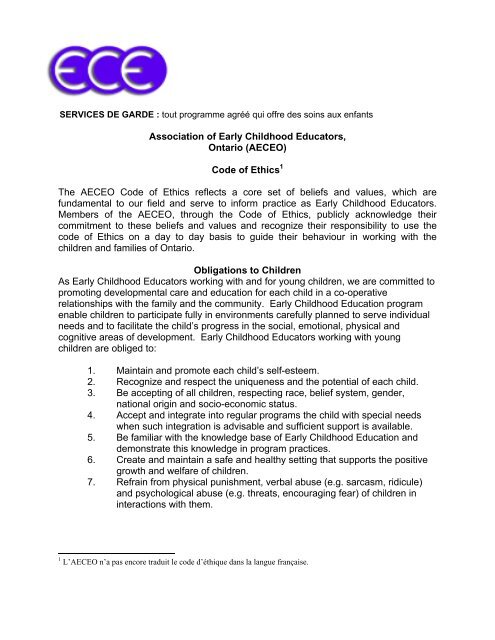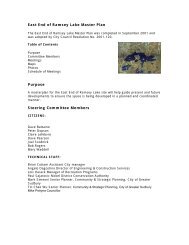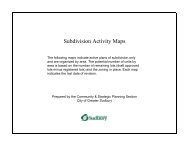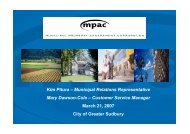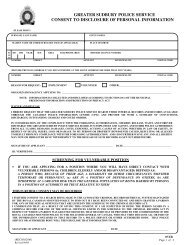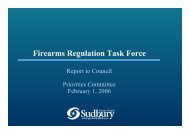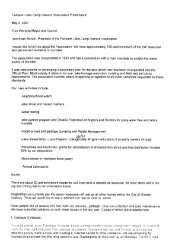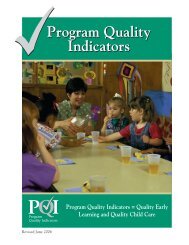Indicateurs de la qualité des programmes ... - Grand Sudbury
Indicateurs de la qualité des programmes ... - Grand Sudbury
Indicateurs de la qualité des programmes ... - Grand Sudbury
You also want an ePaper? Increase the reach of your titles
YUMPU automatically turns print PDFs into web optimized ePapers that Google loves.
SERVICES DE GARDE : tout programme agréé qui offre <strong>de</strong>s soins aux enfants<br />
Association of Early Childhood Educators,<br />
Ontario (AECEO)<br />
Co<strong>de</strong> of Ethics 1<br />
The AECEO Co<strong>de</strong> of Ethics reflects a core set of beliefs and values, which are<br />
fundamental to our field and serve to inform practice as Early Childhood Educators.<br />
Members of the AECEO, through the Co<strong>de</strong> of Ethics, publicly acknowledge their<br />
commitment to these beliefs and values and recognize their responsibility to use the<br />
co<strong>de</strong> of Ethics on a day to day basis to gui<strong>de</strong> their behaviour in working with the<br />
children and families of Ontario.<br />
Obligations to Children<br />
As Early Childhood Educators working with and for young children, we are committed to<br />
promoting <strong>de</strong>velopmental care and education for each child in a co-operative<br />
re<strong>la</strong>tionships with the family and the community. Early Childhood Education program<br />
enable children to participate fully in environments carefully p<strong>la</strong>nned to serve individual<br />
needs and to facilitate the child’s progress in the social, emotional, physical and<br />
cognitive areas of <strong>de</strong>velopment. Early Childhood Educators working with young<br />
children are obliged to:<br />
1. Maintain and promote each child’s self-esteem.<br />
2. Recognize and respect the uniqueness and the potential of each child.<br />
3. Be accepting of all children, respecting race, belief system, gen<strong>de</strong>r,<br />
national origin and socio-economic status.<br />
4. Accept and integrate into regu<strong>la</strong>r programs the child with special needs<br />
when such integration is advisable and sufficient support is avai<strong>la</strong>ble.<br />
5. Be familiar with the knowledge base of Early Childhood Education and<br />
<strong>de</strong>monstrate this knowledge in program practices.<br />
6. Create and maintain a safe and healthy setting that supports the positive<br />
growth and welfare of children.<br />
7. Refrain from physical punishment, verbal abuse (e.g. sarcasm, ridicule)<br />
and psychological abuse (e.g. threats, encouraging fear) of children in<br />
interactions with them.<br />
1 L’AECEO n’a pas encore traduit le co<strong>de</strong> d’éthique dans <strong>la</strong> <strong>la</strong>ngue française.


